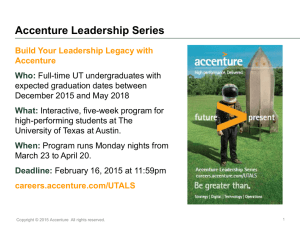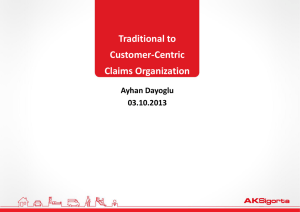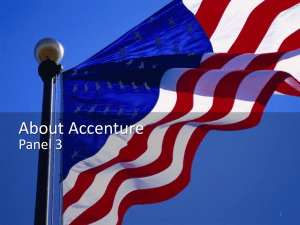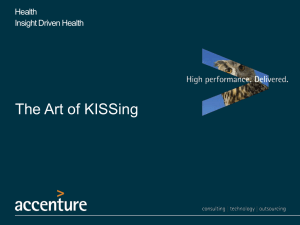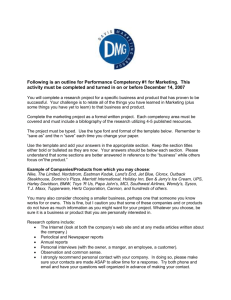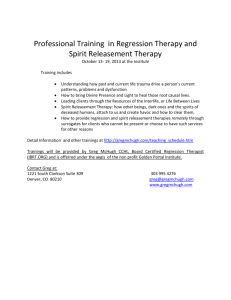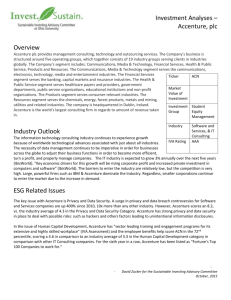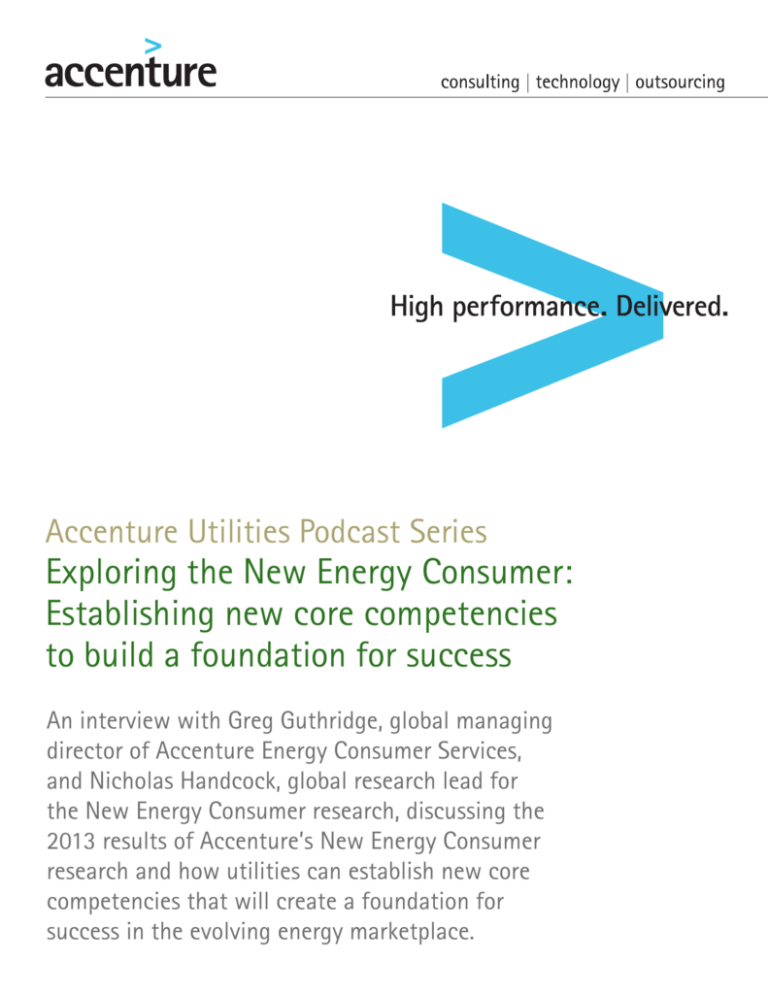
Accenture Utilities Podcast Series
Exploring the New Energy Consumer:
Establishing new core competencies
to build a foundation for success
An interview with Greg Guthridge, global managing
director of Accenture Energy Consumer Services,
and Nicholas Handcock, global research lead for
the New Energy Consumer research, discussing the
2013 results of Accenture’s New Energy Consumer
research and how utilities can establish new core
competencies that will create a foundation for
success in the evolving energy marketplace.
Narrator:
Welcome to the latest installment
of the Utilities Podcast Series. We
are covering an interview with
Greg Guthridge, global managing
director of Accenture Energy
Consumer Services, and Nicholas
Handcock, global research lead
for the New Energy Consumer
research. Today, we will be
discussing the latest findings and
perspectives from Accenture’s New
Energy Consumer research. Greg,
Nicholas, thank you for joining us.
Nicholas Handcock:
Thank you. So, Greg, I know this is
the fourth year of the New Energy
Consumer research program, and
I was wondering if you could give
us a little bit of background on
what the research program is all
about and how this current year
of research fits in to the overall
program.
Greg Guthridge:
Thanks, Nicholas. This is our fourth
consecutive year of looking at the
new energy consumer, and our
focus is on gas, electricity and
water utilities and energy providers.
In particular, we are focusing on
understanding emerging consumer
trends and preferences, trying
to identify new challenges and
opportunities for utilities and
energy providers to help them
bring more focus to the critical
competencies required to succeed
in the evolving energy marketplace.
Nicholas Handcock:
One area we have heard a lot about
in the media and from our clients
is customer satisfaction and trust,
and it has definitely been a critical
area for a number of years. What
insights does the research offer
around customer satisfaction and
trust?
Greg Guthridge:
This is definitely a pillar of all of
our research over the four years.
Customer satisfaction and trust do
two things for an energy provider.
First, satisfied customers tend to
cost less, they tend to interact
less and their economics of
dissatisfaction are lower. The other
thing is when you have satisfied
customers, they stick around
longer, and your regulator allows
you a potentially higher rate of
return. So the economics of having
highly satisfied customers are
critical.
Customer satisfaction and trust
is a key area, and what is really
fascinating is, in our fourth year, it
is at an all-time low globally. Year
after year, satisfaction has fallen. In
fact, at this point, just 47 percent
of consumers say they are satisfied
with their energy provider.
Our research also shows that what
really drives trust and satisfaction
is getting the basics right. This
is critical. It is not about adding
more complexity and more pricing
options and more products and
services and more channels; it is
actually pretty simple: Accurate
bills, reliable energy and easy-tounderstand pricing are critical. In
many cases, providers have evolved
over time and are now much more
complex. If energy providers were
to do nothing more than remove
“dissatisfiers” and simplify the
layers of complexity that have
built up in their organizations, they
would hit the bottom line. They
would reduce their cost structures,
sometimes dramatically, maybe 20
to 30 percent, and they would see
their customer satisfaction go up,
their churn levels go down, and
the overall value of the customer
interaction going in the right
direction.
So getting the basics right is more
than just consistent delivery; it is
also about simplification, and we
believe that is an important part of
becoming an agile energy provider
in the future.
Nicholas Handcock:
From this year, in particular, was
there anything that surprised you
in the research with the insights
that came out?
Greg Guthridge:
Three things in particular are
fascinating. The first is, when it
comes to marketing and appealing
to consumers globally around
energy management, around energy
efficiency and demand response,
it is pretty clear from our research
that terms like “energy efficiency,”
while effective with adults, do not
resonate with the larger consumer
base. If you changed from talking
about energy efficiency to talking
about waste—don’t waste money,
don’t waste my time, don’t waste
your food—our research shows very
clearly that more than one-third
of consumers will act more quickly
and the messaging and marketing
will resonate more soundly.
The second thing that came
through in our research this year
is what we call “beyond a bill
payer.” Most energy providers
and utilities today, if we are to
be really honest, have one, and
only one, relationship, and it
tends to be with the bill payer.
When you think about it, there
are many more influencers and
1
consumers of energy who live in
these households and work in these
businesses than those with whom
we tend to have interactions. If you
broaden your scope and start to
look at the full ecosystem of people
involved in influencing energy in
the home, you find that a pretty big
percentage of them, beyond the bill
payer, happen to be less than 4 feet
tall. They are children, and these
children clearly influence a lot of
the energy consumption in the
home, and really push our thinking
in terms of how to interact with
them, how to influence them, how
to get them motivated around
waste and using energy more
efficiently. That could be through
games, social competitions, any
number of things. Coming through
in the research this year was a
strong emphasis on moving beyond
the bill payer and starting to
look at those other occupants in
the home who have a significant
influence.
The third thing is the rise of group
switching. This is not a new theme:
consumers grouping together
and using their larger purchasing
power to switch to other providers.
It is increasing radically. Our
research shows that 83 percent of
consumers are motivated to join
a group of consumers and switch
if there is a benefit to them—in
particular, if there is a savings on
their energy bill. Not only that,
but 80 percent of consumers
would encourage others to join the
group as well. This is a significant
threat, and this power in numbers
is increasingly important for
energy providers to pay attention
to. With distributed generation
and solar panels and other new
capabilities, we see more and more
of this activity of group switching
and group purchasing power
capabilities. This can be done inside
or outside the competitive market,
so it’s fascinating to see the effects
of this in our research, and the
implications for energy providers to
consider.
Nicholas Handcock:
With all of these insights in mind,
Greg, what does this mean for
energy providers as they move
forward?
Greg Guthridge:
It boils down to getting back to
basics and focusing on four key
core competencies. The first core
competency, and the foundation
for anything, is delivering
operational excellence. This boils
down to getting back to the basics,
removing “dissatisfiers,” which can
have a huge economic benefit, and
delivering simple, easy-to-use and
consistent bills and invoices, and
dealing with people’s problems in a
natural manner.
The second thing that came out
loud and clear and the second
core competency to focus on,
once you’ve got the basics right, is
optimizing customer interaction.
There’s no question that across
the globe in every industry, digital
strategies and digital self-service
are disrupting the traditional
means of communication. This
is good news for utilities. We
believe 60, 70, maybe even a
higher percentage of customer
interactions for an energy provider
can be handled automatically
through a combination of Web,
mobile and telephone-based selfservice. Customers like it better,
it is 24/7, and the only thing we
really need to focus on is how we
make it easy for consumers to
use. We need to take the complex
business processes we have today
and boil them down to something
that is simple and intuitive. If we
can do that, consumers will start
to use it more frequently. If we can
achieve a real mind-set change, a
real paradigm shift on customer
interaction and digital usage, the
remaining interactions—sales and
problem solving—can be handled in
a more personalized, relationshiporiented manner, either in person
or through voice communication,
and that could be a much more
rewarding experience than they get
today.
The next core competency, once
you have an operationally excellent
foundation and have optimized
your customer interaction,
is creating lasting customer
engagement, which is more
than just customer satisfaction.
Engagement is about loyalty. It is
about having a positive point of
view on your utility and creating an
environment in which consumers
feel as if they have choices and
are engaged. Our research shows
over and over that consumers
are very engaged when they are
using digital interactions, and
there are all kinds of interesting
opportunities to tailor the inperson learning experiences and
innovate around solutions that
are fun for the whole family.
So that would be the next core
competency: creating sophisticated
customer value, customer
satisfaction, loyalty and trust.
Finally, the fourth competency is
extending the value proposition,
which means moving beyond the
commodity of just selling gas
or electricity or water. It means
focusing on new value-added
2
propositions, new products and
services, new “set and forget”
technologies that can add value
and for which consumers will pay a
premium. It is true in our industry
that there’s a lot of interest in
finding the golden egg: What are
these new products and services?
We have some good ideas in our
research. We have a good sense
of what energy consumers are
interested in buying from their
energy providers. This will vary
around the world, but the key
thing, again, is to get the basics
right, which gives you the right to
extend the value proposition and
an opportunity to win them over in
a broader sense.
Ultimately, these competencies
establish a base for the future,
and our research is well-organized
around each of these four themes
and provides actionable, pragmatic
advice on how to approach them.
Narrator:
Thank you, Greg and Nicholas, and
I would like to thank our listeners
for joining us for this installment of
the Utilities Podcast Series. To learn
more about the Accenture utilities
industry, to hear other podcasts in
our series, and to see our recently
published New Energy Consumer
research, please visit our website at
www.accenture.com/utilities.
Copyright © 2013 Accenture
All rights reserved.
Accenture, its logo, and
High Performance Delivered
are trademarks of Accenture.
3

